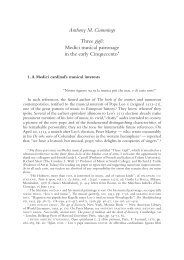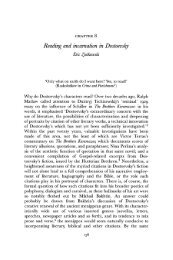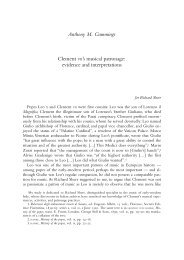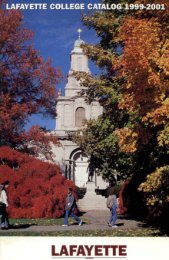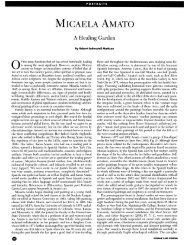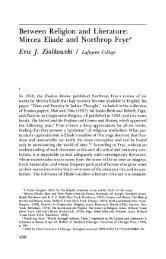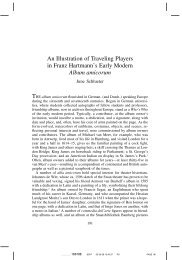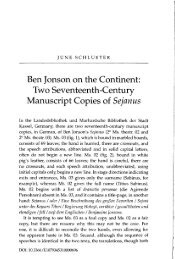Swift's “Skinnibonia”: A New Poem from Lady ... - Lafayette College
Swift's “Skinnibonia”: A New Poem from Lady ... - Lafayette College
Swift's “Skinnibonia”: A New Poem from Lady ... - Lafayette College
You also want an ePaper? Increase the reach of your titles
YUMPU automatically turns print PDFs into web optimized ePapers that Google loves.
328<br />
James Woolley<br />
shoes.”45 Here take down means “humiliate,” a sense that survives in our idiom<br />
“to take someone down a peg,”46 and the proverb means that to show the wife<br />
who’s boss, the husband should humiliate her even before she has gotten out<br />
of her wedding clothes. Swift, however, twists the conceit so that the prudent<br />
husband, instead of “taking down” the wife, takes down her shoes—shortens the<br />
high heels which could be part of women’s modish dress in the 1720s.47 Swift takes<br />
anxieties about whether Sir Arthur’s marriage contract brought him less wife than<br />
he bargained for and reduces them to a recommendation of heel shortening, not<br />
just to keep <strong>Lady</strong> Acheson <strong>from</strong> “walk[ing] a-wry” but also to save money on<br />
luxurious silk petticoats. And that is where the poem ends.<br />
As “family verses of mirth,” this rollicking poem was probably meant to be<br />
read aloud, perhaps with appropriate vocal and gestural mimicry, as after-dinner<br />
or evening entertainment, like other Market Hill poems that allude humorously to<br />
family members, houseguests, servants, and neighbours. The new poem also seems<br />
designed to manage tensions between Swift and his hosts, including the fact that<br />
it was Anne rather than Arthur to whom Swift was particularly drawn, spending<br />
much time with her taking walks, tutoring her in Plato,48 Lucretius,49 Bacon,50 and<br />
45 ”We have a sort of Proverbial Expression of taking a Woman down in her Wedding Shoes, if you<br />
would bring her to Reason”: Tatler, no 231 (30 September 1710), in The Tatler, ed. Donald F. Bond,<br />
3 vols (Oxford: Clarendon Press, 1987), III, 196. Contemporary examples: Mary Pendarves to Anne<br />
Granville, 5 December 1728: “A saucy flirt, may be humbled, and brought down in her wedding-<br />
shoes soon” (The Epistolary Correspondence of Mary Granville, Mrs. Delany, ed. <strong>Lady</strong> Llanover, 6 vols<br />
[London: Bentley, 1861-62], I, 181); Jane Barker, “This transaction [was] very grievous to me; and<br />
did, as it were, take me down in my Wedding-shoes” (The Lining of the Patch-Work Screen [London:<br />
Bettesworth, 1726], p. 114); the husband had “so much of the Man in him, as to take [the wife] down<br />
in her Wedding Shoes” (Cupid’s Decoy: or, The Fatal Snare. Shewing the Miserable Condition Most Men<br />
are under in the State of Matrimony, 3rd ed. [London: Marshall, ?1730], pp. 62-63). See also The<br />
Oxford Dictionary of English Proverbs, 3rd ed. (Oxford: Clarendon Press, 1980 [1970]), under “Wife<br />
(shrew).”<br />
46 Oxford English Dictionary, online edition, under take, sense 82 (“take down”).<br />
47 See R. Turner Wilcox, The Mode in Footwear (<strong>New</strong> York and London: Scribner’s, 1948), p. 130; John<br />
Peacock, Shoes: The Complete Sourcebook (London: Thames & Hudson, 2005), pp. 60, 74.<br />
48 <strong>Poem</strong>s, ed. Williams, III, 891.<br />
49 Presumably Lucretius was their source for Epicurus (<strong>Poem</strong>s, ed. Williams, III, 891). Another Market<br />
Hill poem also alludes to Lucretius (“Journal of a Dublin <strong>Lady</strong>,” ll. 184-85). Dirk F. Passmann and<br />
Heinz J. Vienken point out a copy of Lucretius’ De Rerum Natura (Amsterdam, 1631), now Pierpont<br />
Morgan Library E2.50.D, that belonged to Swift and that has an old ownership signature “Acheson”;<br />
they speculate that this is the copy Swift read at Market Hill (Passmann and Vienken, II, 1122). This<br />
signature is, however, that of the book collector Archibald Acheson, the third Earl of Gosford (1806-<br />
64), <strong>from</strong> the period when he bore the courtesy title Lord Acheson (1806-49), and the type in this<br />
volume is, I think, too tiny for Swift to have read it with any comfort as late as 1728. The volume<br />
seems to have been Swift’s gift to John Jackson, presumably at an earlier date; and I doubt for these<br />
reasons that Lord Gosford acquired the book by inheritance.<br />
50 <strong>Poem</strong>s, ed. Williams, III, 855.




